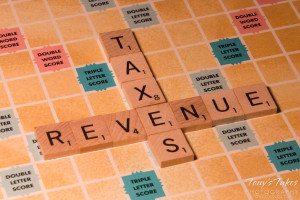In November, Coloradans will likely be voting on a scheme to raise the state sales tax to support state and local transportation projects.

Unfortunately, raising sales taxes would hit all the wrong people, and provide a particularly unstable revenue stream to fund this infrastructure.
It’s no secret that Colorado’s roads and bridges are a mess. They have failed to keep pace with the state’s growth, even as maintenance has fallen behind.
You either end your weekend trip to the mountains on Sunday morning or you pack a picnic lunch for the parking lot home. Daily commutes on I-25 come to a standstill between Colorado Springs and Castle Rock. And driving around Denver means a permanent sinking fund for front-end alignments.
We’re in this state of affairs because the Colorado legislature has consistently failed to spend money on roads and bridges instead of other pet projects. This year, the legislature passed Senate Bill 1 in an attempt to address the problem, but almost everyone agrees that the paltry spending past the first two years is an inadequate solution.
In response, the Metro Denver Chamber of Commerce and the Colorado Contractors Association have proposed raising the state sales tax from 2.90 percent to 3.52 percent, and authorizing up to $6 billion in bonds. The additional revenue would be divided among state highways, local governments, and multi-modal (transit) projects.
If that 2.90 percent sounds suspiciously low to you, it’s because you are almost certainly paying more than that at the store. Virtually every county or city in Colorado has an additional sales tax, along with special district taxes for things like regional transit or museums.
The Tax Foundation puts the average Colorado sales tax at the register at 7.50 percent, 16th-highest is the country. Passing this increase would bump us up to 8.12 percent, ranking Colorado 13th. A fair number of Colorado cities and towns would charge over 9 percent, including Boulder, Aurora, Lakewood, and Westminster. Mountain tourist towns like Snowmass and Winter Park would charge over 11 percent. By comparison, #10 California averages 8.25 percent.
![]() One thing that both left-leaning groups like the Institute on Taxation and Economic Policy, and right-leaning groups like the Tax Foundation agree on is that sales taxes are regressive, hitting poor and lower-income buyers harder.
One thing that both left-leaning groups like the Institute on Taxation and Economic Policy, and right-leaning groups like the Tax Foundation agree on is that sales taxes are regressive, hitting poor and lower-income buyers harder.
Colorado tries to solve this problem by excluding certain items from sales tax including, most prominently, food for home consumption and residential gas & electricity. But since wealthier citizens have larger homes and more expensive tastes, and their purchases are likewise exempted, the inequality remains.
Indeed, some of the jurisdictions with the highest rates of poverty are also those with the highest rates of this regressive tax. The cities of Boulder, Grand Junction, Denver, Englewood, and Glenwood Springs would all have sales tax rates higher than the California average. They would also each have poverty rates in excess of 15 percent, well above Colorado’s overall 11.2 percent.
Worse, Colorado would be trying to fund ongoing infrastructure needs with an uncharacteristically volatile revenue source.
The Pew Trusts Project for the States’ Fiscal Health tracks revenue from different sources, issuing an overall volatility score and a volatility score by source, for the years 1997-2016. Nationally, sales taxes are among the most stable sources of revenue, with a volatility score of 6.09. Only motor fuels are more stable.
However, Colorado’s sales tax revenues have the 3rd-worst volatility score among the 45 states with a sales tax. These results go hand-in-hand with Colorado’s volatile overall receipts, the 6th-bounciest in the country. Ironically, by narrowing the items on which the tax is levied, the very exemptions intended to increase fairness are also contributing to the revenue’s wild unpredictability.
That unpredictability calls into question the sales tax’s ability to fund projects into the future in the inevitable event of a recession.
Given the way the legislature has allocated funds in the past, the most likely outcome is that projects don’t get funded that year, or the next, or the next, and then, somehow, never get funded again. Never, that is, until the government and the Chamber cry poor and come back to the citizens to demand yet another tax increase.
Instead of hitting the people who can least afford to pay with a tax that won’t even reliably deliver on its promises, let’s make the legislature do its job, make the choice to prioritize roads with the money it already has.
Joshua Sharf is a fiscal policy analyst at the Independence Institute, a free market think tank in Denver.
Sales tax hike for transportation a regressive, unstable funding scheme
Leave a Reply